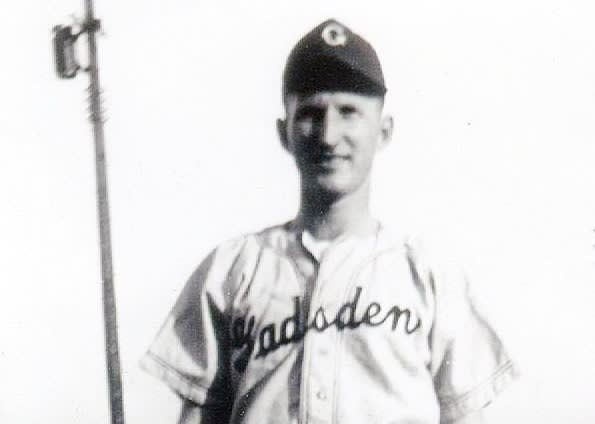Update 1-16-2025
Stories of the famous and not-so-famous men and women from a time when baseball was "Arkansas' Game." Backroads and Ballplayers Weekly is always free and short enough to finish in one cup of coffee.
Miss Oleta!
In the late 20-teens, I spent nine wonderful years at Two Rivers School District in Yell County. Technology as an educational tool was new. Moving to untried ideas that embraced the possibilities of student-centered projects required some scary out-of-the-box thinking. The faculty, students, and administration were all in.
One of the productions that turned out to be the most successful was a baseball history project that involved some talented students and special local folks with a baseball story to tell.
Among these stories, was a documentary of the baseball life of former Casa superintendent Bill Baskin. Along the way to sharing Mr. Baskin’s story, we all fell in love with a petit little lady named Oleta Baskin. One person close to the project commented, “She was precious.” Indeed she was.
This past week, we lost Miss Oleta. I will never forget her lovable spirit and inclusive personality. Below is Mr. Baskin’s story.
In 1947, a math teacher from Casa, Arkansas, won 12 games for the Gadsden, Alabama, Pilots. It looked like William Dewey Baskin Jr. was headed for the major leagues. Despite his love of the game, baseball would not be his career destination. Baskin’s uncommon love for family and community would be the primary influence on his career decisions.
In 1944, at age 23 and right out of college, right-hander Bill Baskin made his minor-league debut with the Memphis Chicks, a farm team of the St. Louis Browns. Baskin saw little action with the Chicks that summer, but in the 1945 season he became a minor-league star.
Baskin caught on with Hagerstown, Maryland, in the Interstate League on the East Coast. The Hagerstown Owls competed in a league with teams called the Blue Rocks, White Roses, Red Roses, and more common today, Cardinals and Spartans. Bill Baskin was the Owls’ best pitcher and led the team in innings pitched and wins. Ironically, Hagerstown was an affiliate of the Chicago Cubs. How difficult it must have been for the long-time Cardinals fan to reconcile that he was a prospect in the arch-rival Cubs organization!
Like many pro baseball players in the mid-1940s, Baskin found himself in the armed services in 1946 and lost an opportunity for a promotion he would have undoubtedly earned after the outstanding year in Hagerstown. Bill Baskin was now a part-time pitcher and his full-time uniform was that of the U.S. Navy.
The 1947 season found him back in baseball with Gadsden Pilots where he won 12 games and lost 8 for the Pilots. He enjoyed his most memorable night on the mound in June of that year when he pitched a no-hitter in the second game of a doubleheader against Selma. The newspaper account of the game stated the excited fans passed the hat after the game to present their pitching star with a little extra spending money.
While Baskin the pitcher was still successful in the minor leagues and the class B Gadsden Pilots were not that far competitively from the majors, the 1948 season found the 28-year-old Arkansas educator a man with different priorities.
In April, Bill Baskin had married the love of his life, Oleta English, from down the road in Plainview, Arkansas. She spent the summer with him in Gadsden, Alabama, population about 50,000, a city she describes “as bewildering as New York City.”
After the 1948 season, Bill Baskin the professional pitcher in the summer, became “Mr. Baskin” the math teacher, coach, and later superintendent at Casa School District. This time for good. When Mr. Baskin and Miss Oleta came back to Casa in the fall of 1948, he made his last uniform change. He traded the gray flannels with Pilots on the front for the white shirt and tie that was his usual uniform at Casa Schools.
Bill Baskin, the pitcher, continued to pitch on weekends for area teams, and a semipro team from Danville he pitched for is still regarded as one of the area’s all-time best collections of local baseball talent. Was Bill Baskin the pitcher headed for a major league career? No one knows the answer, but Mr. Baskin the educator undoubtedly never cared. He and Miss Oleta were home doing what they felt destined to do and their legacy can still be found in the hundreds of former students who benefitted from that difficult career decision Mr. Baskin made in the fall of 1948.






